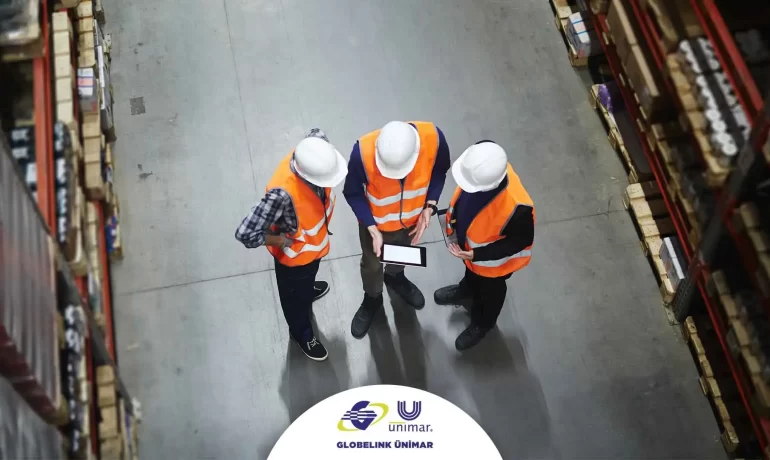
- October 8, 2021
- Blog
The global volume of the logistics industry has reached 6 trillion dollars in the world trade, which was reshaped by the pandemic. The volume increasing along with the pandemic in the rapidly digitalizing market has increased the warehouse investments in the industry.
The world logistics market reached a size of 5.2 trillion dollars at the end of 2020. By the end of 2021, this figure is expected to reach 5.5 trillion dollars. The 2021-2026 forecasts of IMARC Group -one of the global market research companies- for the logistics industry are remarkable: According to the research company, the volume of the industry will reach 7 trillion dollars in 2026.
In Turkey, on the other hand, warehousing solutions are on the agenda of the logistics industry. Continuing its growth with firm steps, the Turkish logistics industry is digitalizing on the one hand, and it meets the increasing stock demand with e-commerce by investing in warehousing solutions, on the other hand.
Because the e-commerce industry figures in Turkey prove how important the need for warehousing is. Turkey’s e-commerce volüme reached 226.2 billion Turkish Liras in 2020. The rising e-commerce is expected to reach much larger figures in 2021. Even in the first five months of 2021, e-commerce volume reached 150 billion TL. This growth also triggers the logistics industry.
The Place of Warehouses in Logistics Models
Warehouses used in all logistics systems play an important role in achieving a high level of customer satisfaction. Warehouses are used to consolidate products from multiple manufacturing sites, split high-volume product shipments into smaller shipments to customer satisfaction, and combine small loads into a single large-volume shipment to support production in the procurement process and ship to customers in the distribution process.
The use of warehouses in logistics models can be examined under four main headings:
- Collection (consolidation) central logistics model
- Distribution center logistics model
- Product mix logistics model
- Multiple warehouse logistics model
The Potential is Increasing Rapidly
Being an important production base right next to Europe, Turkey is increasing its Performance in the international logistics industry. The Turkish logistics industry, which reached a double growth in the last year, has started to make a leap.
A product is transported for an average of 6,500-7 thousand kilometers in international trade in the world. For this reason, it is expected that access to qualified markets will become much more important. The predictions that World trade will at least double in 30 years are an indication that the vital importance of the logistics industry will increase in the coming period.
Warehousing Capacity may Triple in 10 Years
Warehousing ranks top in the list of the most important areas in which the logistics industry is currently investing. Because Turkey has a great advantage compared to other countries. The total leasable warehouse capacity in Turkey is approximately 15 million square meters. 70% of the total stock in Turkey is located on the Istanbul-Kocaeli axis. Turkey also provides advantages compared to other countries in terms of warehousing fees. While the rental price of the primary warehouse is around 9 dollars per square meter in countries such as Germany and England, this figure is less in Turkey.
Experts predict that the current warehouse capacity will triple in 10 years if the Turkish logistics industry continues its investments in storage and continues its progress in digitalization. If the Turkish logistics industry can benefit from this position well, it will mean growing at least five or six times incapacity in the field of international transportation. This gives the signal of strong growth.
Turkey is increasing its performance in the international logistics industry. This industry doubled in growth in the previous year.
E-Commerce has Caused the Domino Effect
The pie share of e-commerce, which has increased due to the pandemic in recent years, has created the need for companies to keep stock. This situation led to warehouse investments in the logistics industry. On the other hand, triggering the digital transformation in the logistics industry also increased the growth in the Warehousing industry. But one of the main reasons for the growth is the unpredictable increase in e-commerce.
The global e-commerce market, including Turkey, has experienced much more progress than expected. The five-year growth target of countries was reduced to 1.5 years during the pandemic. The e-commerce rate, which increased to 45 percent in China, reached 25 percent in Europe and the USA. According to the Presidential Annual Program for 2021, it is expected that the Turkish e-commerce volume will reach 240 billion TL and the rate of online shopping will increase to 38%. This expectation also increases the speed of warehouse investments in the logistics industry.
In addition to the domestic market, the volume of e-commerce continues to increase rapidly in international trade. The tendency of consumers to stock more than they need during the pandemic has left companies facing a serious demand explosion in the food and fast-moving consumption group. This situation left the companies to face a serious demand explosion in the food and fast consumption group. On the other hand, problems such as the storage, transportation and preservation of frozen and perishable foods came to the fore as another issue.
Digital Freight Management has Reached $10.1 Billion Worldwide
The Turkish logistics industry is affected by e-commerce, as well as digitalization. Issues such as the traceability of the transported products, instant traceability of the logistics operation from the applications on mobile phones, and real-time, location-based delivery reporting have come to the fore recently. According to the data published by Markets Insider, which conducts research on markets and indices, at the beginning of August, the size of the work produced by digital freight Management platforms reached 10.1 billion dollars at the end of 2020.
Similar growth is clearly expressed in the report published by Gartner in October 2020. The growth in this field is pointed out in the Market Guide for Digital Freight Models for Road Transportation report and information of the leading companies in the USA, China and Europe is also included.
Advantages of the Turkish Logistics Industry
With its geopolitical and strategic importance in terms of geology, Turkey is located in a hub position on a corridor extending from the developing Middle East and Turkic Republics to Europe. Multinational logistics companies’ assets in Turkey, which they maintain in the form of mergers or acquisitions, offer local companies the opportunity to benefit from their technical and technological knowledge, experience and investments. Turkey also owns the largest truck/truck fleet in Europe and the advanced road transport industry.
The Importance of Warehousing for Companies
- It increases customer satisfaction and loyalty.
- It reduces production costs.
- Warehousing is not only the main element of effective customer relationship management but also an important element of cost management.
- It is possible to meet the demands of customers and dealers in the most appropriate way from the warehouses.
- If the warehouse is established in a suitable place, it makes a positive contribution to transportation costs. This benefits the company.
- The customer’s request is met faster.
- It provides the utility of place and time.
- It provides a competitive advantage.
“Our Strategies in Warehousing will Shape our Roadmap”
Globelink Ünimar Warehouse & Domestic Distribution Manager Volkan Yalçın stated that: “Warehousing has gained even more importance with the increasing need for e-commerce and accompanying process management, especially during the pandemic. On the other hand, changing consumer habits also refer to the importance of warehousing together with logistics. The customer’s demand for faster delivery and the increasing importance of ‘proximity to the customer’ increase the importance of warehousing.
As Globelink Ünimar, we continue to accelerate our initiatives in this regard and to increase the quality of the service we offer in response to changing demands and expectations. In this direction, we will respond to the needs and increasing demand with our new warehouse in Istanbul which is equipped with the latest technology.
In addition to meeting the needs of our customers, our new warehouse will also shape our new roadmap on target sectors. What we have experienced in the last two years has sharply demonstrated how valuable market and customer diversification is. In this process, where the supply chain is broken and many sectors are in trouble, creating new target markets is essential not only for your own company but also for the sustainability of the companies you serve. Therefore, with the steps we have taken in the field of warehousing, we will strengthen our infrastructure and expand our customer portfolio, as well as offer our business partners new markets where they can present their products.
On the other hand, meeting the demand alone is not enough, it also needs to be managed. Two main issues come to the fore here: The timely departure of the product from the warehouse and the distribution processes. However, these two subjects contain a strong organizational chart. In addition to requiring qualified human resources, order management system and distribution network, this schema requires timely and safe delivery of the product to the customer, transparency and accessibility, as well. As a company that focuses on customer satisfaction, efficiency and quality, we create an up-to-date and continuous supply chain by combining all these subjects required by the storage and distribution processes with automation.
Our main goal in all the work we do is to operate with high standards. In today’s conditions, automation and technology have become the main actors in the formation of this standard. Today we are talking about the digitalization of many steps in the supply chain. This is an inevitable reality for all legs from production to storage and from distribution to delivery. However, there is one more fact: For Turkey, where technological revolutions such as robotics, artificial intelligence and the Internet of Things are still at the prototype stage, the human resource will continue to maintain its presence as the strongest capital in the coming years. At this stage, I, as a believer in human ability, see the investments to be made in human management and development as a prerequisite for investment in the autonomous system of the future.”
Artificial Intelligence is Both Changing and Transforming
Today, we can see the clues that we will
The Future of the Cargo Market is Shaped by e-commerce
The e-commerce industry has been growing rapidly since the



